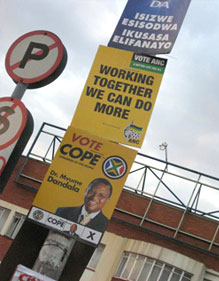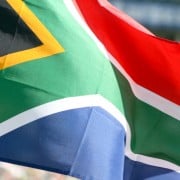|
Getting your Trinity Audio player ready...
|
 Dear Corruption Watch,
Dear Corruption Watch,
Last week you looked at how public funding designated for elections is monitored, but how can we be sure that political parties do not use other public funds for electioneering? Are ministers, premiers and MECs allowed to use their official cars and helicopters? Can they dispense food bought with public money while campaigning, saying they are merely acting as government officials alleviating hunger? Are employees of the state (as opposed to elected officials) permitted to take part in party political campaigning?
Election Watcher
Dear Election Watcher
All public officials, elected or otherwise, are subject to laws that regulate how they may use state resources and spend public money.
Spending it on a political party’s election campaign would almost certainly fall outside the ambit of what those laws allow public officials to do.
The difficulty is determining whether a public official who arrives bearing food packages is doing so as part of a genuine government campaign and is therefore within the bounds of the law, or whether that official is simply campaigning for his or her political party.
Tell-tale signs that something is amiss and that a public official is misspending state resources include when the intervention is entirely ad hoc and not part of a general policy; the public official comes wearing his or her party regalia and is not dressed as a representative of the government; there is an impending election and the area in question has a considerable number of undecided voters or voters who need motivation to vote; and when the goods or service are delivered with reminders to vote.
If it can be established that money was spent or that resources were used unlawfully, the official should normally be exposed to some sort of punishment for misconduct.
However, it is one thing to punish individuals who misspend public funds to help out their political parties and quite another to ensure that the political party in question receives some form of censure for unfairly benefiting from state resources. For this reason, political parties and their members are subject to the Electoral Act and the electoral code of conduct.
One of the purposes of the act and the code is to promote conditions that are conducive to free and fair elections, including free political campaigning. An election in which one political party enjoys not only its private resources, but also illegally procured public resources, is clearly not free and fair.
For this reason, the act and the code prohibit political parties, members and supporters from unlawfully persuading people to vote. Similarly, the code stipulates that no person, which would include ministers, premiers, MECs and other members of the government, may abuse their position of power to influence the conduct or outcome of an election.
These provisions almost certainly cover situations in which public officials misspend public funds to support their political party’s campaign.
If it can be shown that the political party in question conspired with the official to have that public money spent on its campaign, the party will almost certainly be in contravention of the act and the code.
When that happens, the Electoral Court is given a wide range of sanctions that it may impose on the party. On the tamer end, the court may issue a warning or a fine, but if the transgression is particularly bad, the court may also stop the party from campaigning, reduce the number of votes it receives, or even cancel its registration in the election.
Would it not be simpler to ban state employees from campaigning? In that way, abuses could be minimised or avoided altogether. It would certainly be simpler, but almost definitely unconstitutional. Section 19 of the constitution is clear that every citizen is free to make political choices, which includes the right to campaign for a political party.
Being an employee of the state does not strip individuals of this foundational political right.
However, because state employees will often enjoy positions of power, they should make it clear when campaigning that they are doing so in their private capacity and not on behalf of the government or any government agency.
• This article was first published in Sunday Times: Business Times







